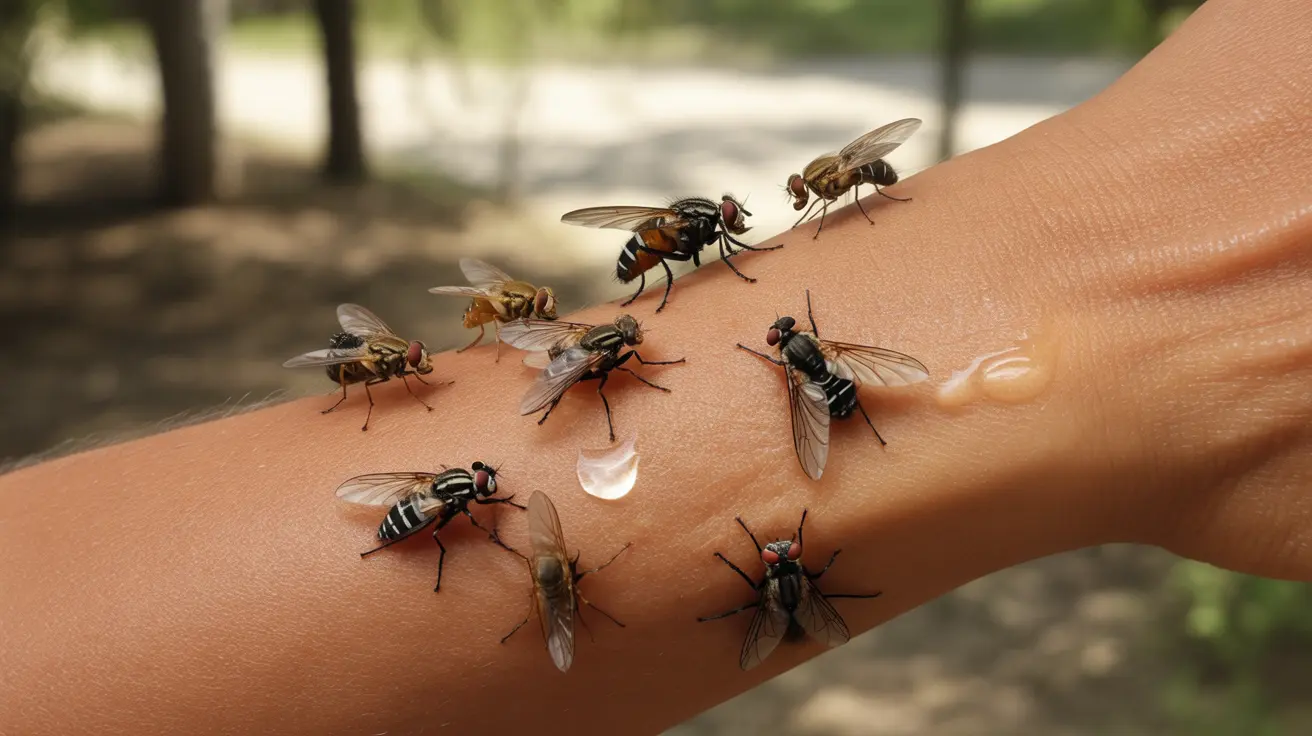Many people are surprised to learn that certain types of flies can and do bite humans. While not all flies bite, several species are known for their painful bites that can cause discomfort, swelling, and in some cases, more serious complications. Understanding which flies bite and how to handle these encounters is essential for anyone who spends time outdoors.
In this comprehensive guide, we'll explore the different types of biting flies, what their bites feel like, how to treat them, and when to seek medical attention. We'll also provide practical prevention strategies to help you avoid these uncomfortable encounters.
Common Types of Biting Flies
Several species of flies are known to bite humans, each with distinct characteristics and behaviors:
Horse Flies
These large, aggressive flies deliver particularly painful bites. They use razor-sharp mouthparts to cut the skin and feed on blood. Horse flies are most active during warm, sunny days and are commonly found near wooded areas and pastures.
Deer Flies
Smaller than horse flies but equally aggressive, deer flies typically target the head and upper body. Their bites can be quite painful and may cause significant swelling. They're often found in wooded areas and near bodies of water.
Black Flies
Also known as buffalo gnats, these small flies swarm in large numbers and deliver bites that can cause intense itching and swelling. They're particularly common near running water during spring and early summer.
Stable Flies
These flies resemble house flies but have a painful bite. They typically target the ankles and lower legs, causing sharp, stinging sensations. They're common around farms and beaches.
Identifying Fly Bite Symptoms
Fly bites typically cause several distinctive symptoms:
- Sharp, stinging pain at the bite site
- Redness and swelling
- Itching or burning sensation
- Small, red welt or bump
- Possible bleeding at the bite location
Treatment Options for Fly Bites
Most fly bites can be treated effectively at home using these methods:
- Clean the bite area with soap and water
- Apply a cold compress to reduce swelling
- Use over-the-counter antihistamine creams
- Take oral antihistamines for severe itching
- Apply calamine lotion or hydrocortisone cream
Prevention Strategies
To minimize your risk of fly bites, consider these preventive measures:
- Wear light-colored, long-sleeved clothing
- Apply EPA-registered insect repellent
- Avoid peak activity times (dawn and dusk)
- Stay away from known breeding areas
- Use protective netting when necessary
- Keep moving, as many biting flies target stationary hosts
When to Seek Medical Attention
While most fly bites are harmless, some situations require professional medical care:
- Signs of infection (increased swelling, warmth, or pus)
- Severe allergic reactions
- Fever or flu-like symptoms
- Bite wounds that won't heal
- Multiple bites causing significant discomfort
Frequently Asked Questions
What types of flies commonly bite humans and what do their bites feel like?
Common biting flies include horse flies, deer flies, black flies, and stable flies. Their bites typically feel like sharp, sudden stings, often more painful than mosquito bites. Horse fly bites are particularly painful and may draw blood, while black fly bites cause intense itching and swelling.
How can I treat symptoms like itching, swelling, and pain from fly bites at home?
Home treatments include washing the area with soap and water, applying cold compresses, using antihistamine creams, and taking oral antihistamines for severe itching. Over-the-counter pain relievers can help manage discomfort, and calamine lotion can soothe itching.
Are fly bites dangerous and when should I seek medical attention?
While most fly bites are merely uncomfortable, they can become dangerous if they get infected or trigger severe allergic reactions. Seek medical attention if you develop signs of infection, severe swelling, fever, or symptoms of an allergic reaction.
What are the best ways to prevent fly bites when outdoors?
The most effective prevention methods include wearing protective clothing, using insect repellent, avoiding peak activity times, and staying away from areas where biting flies breed. Light-colored, long-sleeved clothing and pants can provide significant protection.
Can fly bites cause allergic reactions or infections, and how are these managed?
Yes, fly bites can cause allergic reactions ranging from mild to severe, and they can become infected if bacteria enter the bite wound. Mild allergic reactions can be managed with antihistamines, while severe reactions require immediate medical attention. Infections may need antibiotic treatment prescribed by a healthcare provider.




